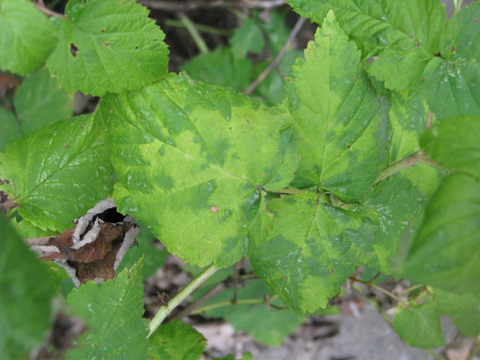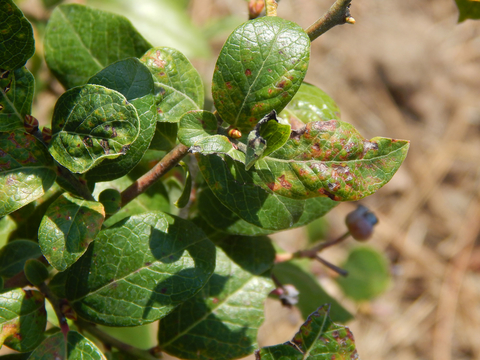Quick facts
- Many different viruses can infect backyard fruit.
- Virus-infected plants may be stunted, produce few or poor quality fruit and have distorted, discolored leaves.
- Once a plant is infected with a virus, it will never recover.
- Virus-infected plants should be completely removed and composted.
- Prevent viral diseases by buying healthy plants and removing weeds from the site before planting.
How to identify viruses on backyard fruit
Plants infected with viruses show many different symptoms, depending on the variety, the virus, weather and the stage of infection.
Possible symptoms:
- Yellow rings, lines or blotches on leaves.
- Distorted leaves.
- Crumbly, underdeveloped fruit.
- Severely stunted plants.
- In some cases, infected plants show few or no symptoms.
The only way to know exactly which virus is causing the symptoms is to send a sample to the UMN Plant Diagnostic Clinic, where they can identify the virus with lab tests.
|
Symptoms on raspberries
- Small, crumbly raspberries.
- Fine, yellow lines and yellow rings on leaves.
- Leaves may or may not show symptoms, depending on the age of the plant and the variety.
- Tomato ringspot virus badly damages red raspberries, while black raspberries are not affected.
Symptoms on blueberries
- Small, distorted and cupped leaves.
- Leaf color is sometimes a mixture of light green and dark green.
- Small, brown spots (less than 1/4 inch) can form on leaves and stem.
- Plants weaken and produce less fruit.
- Plants are often stunted and are more likely to be damaged by winter injury.
- Some blueberry varieties are badly damaged by these viruses. Other varieties have little or no damage.
- Slightly yellow, small leaves which curl downward and inward.
- The disease becomes worse each year.
- By year four, the plants are stunted and produce no fruit.
- The symptoms can be confused with injury by the herbicide glyphosate.
- Raspberry leaf curl is often found on only one plant in a row, while glyphosate injury will usually affect several plants in different amounts.
- Raspberry leaf curl infects red and black raspberries and less commonly, blackberries.
How do viruses survive and spread?
Tomato and tobacco ring spot virus
- This virus infects a wide range of woody and herbaceous plants, including many common ornamental plants and weeds.
- Tomato ring spot virus is spread by the dagger nematode, a microscopic roundworm which lives in the soil and feeds on plant roots.
- Dagger nematode is common in many areas of Minnesota.
- Nematodes get the virus by feeding on infected plants, including weeds like dandelion, chickweed or common plantain.
- Once a nematode gets a virus, it can spread the virus to other plants that it feeds on.
Raspberry leaf curl virus
- Aphids spread this virus from plant to plant.
- In Minnesota, it spreads very slowly.
- Sometimes you see only one or a few plants infected in a patch.
- Once a plant is infected, the virus spreads throughout the whole plant from the roots to the canes.
- Viruses also spread from mother plants to daughter plants.
- New canes that sprout from an infected mother plant always have the same viruses.
How to manage viruses
Before planting
- Before starting a new fruit planting, remove or kill any wild brambles, old raspberry plants and weeds at the site.
- Buy new plants only from a well-known wholesale or retail nursery with a good reputation.
- Buy certified, virus-free, planting stock if you can.
- Never transplant daughter plants from an existing patch with virus infected plants. These new plants will already be infected even if they are not yet showing symptoms of the disease.
Managing an infected planting
- Plants infected with a virus should either be dug up or killed with an herbicide.
- Infected plants will never recover and will only continue to decline and produce poor fruit.
- If plants were infected with raspberry leaf curl virus, new plants can be replanted at the same site.
- If the plants were infected with tomato ring spot virus:
- Don’t replant red raspberries or blueberries at the same site.
- Either replant in a new location or replant the existing site with black raspberries, which will not develop symptoms of the disease.
- The nematodes that carry tomato ring spot virus stay in the soil and it is likely that new plants put in the same site will also become infected.
Reviewed in 2024



